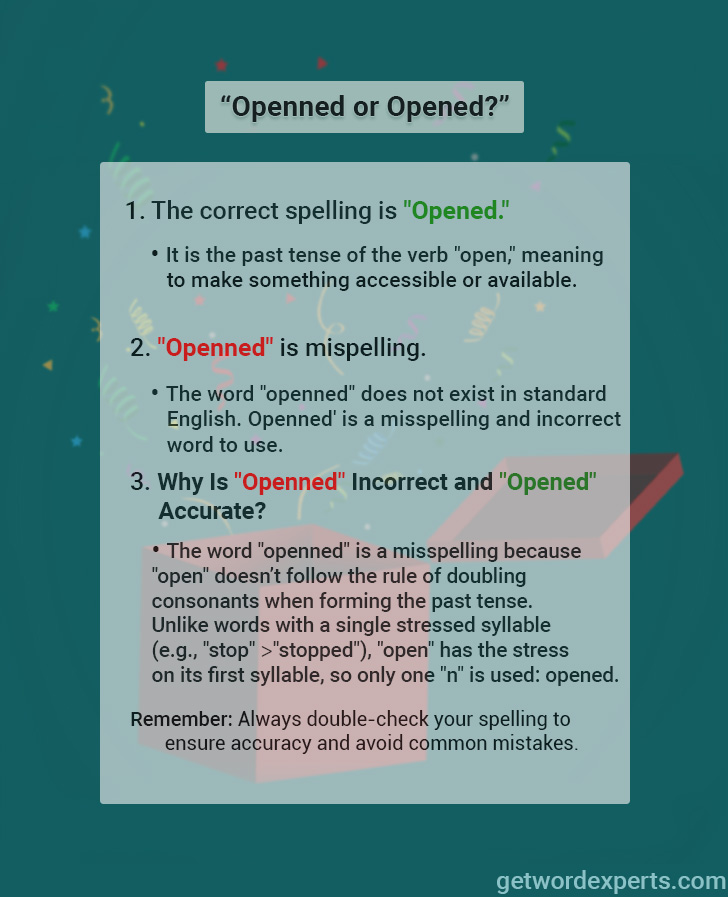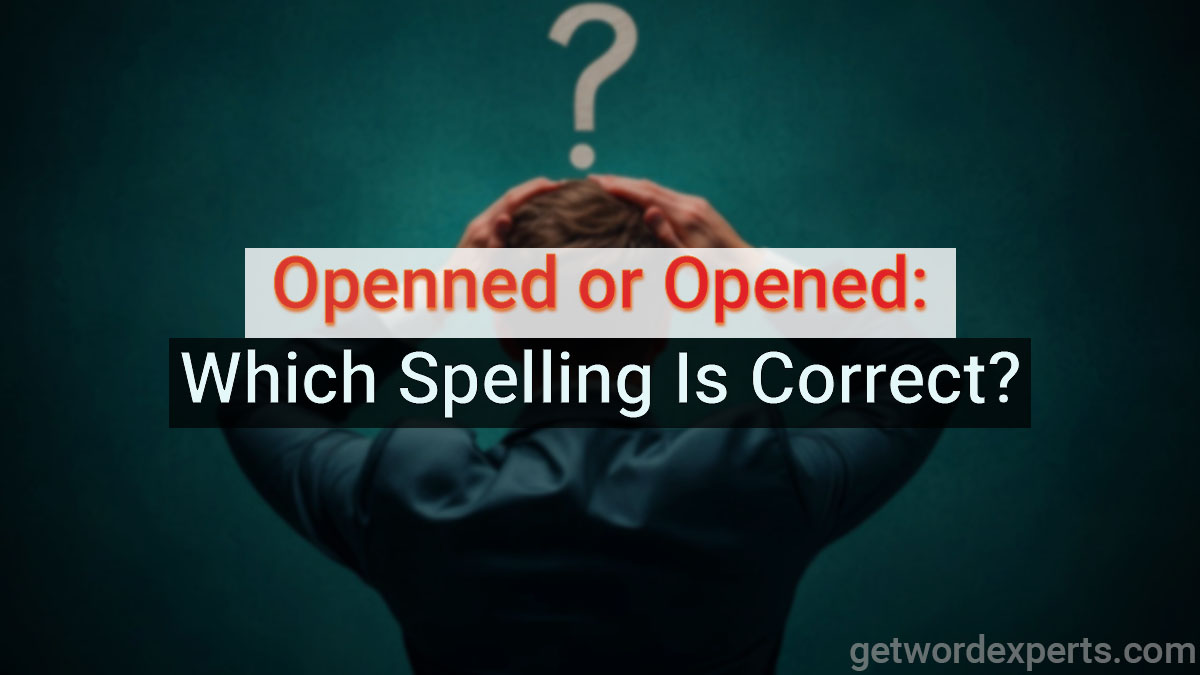If you’ve ever paused to wonder whether to write “openned or opened,” you’re in the right place! English spelling can be tricky, especially with words that look deceptively similar. In this guide, we’ll explore why “opened” is the correct spelling, why “openned” is incorrect, and how to use the word properly in various contexts. By the end, you’ll have complete clarity and practical tips to avoid common spelling mistakes.
What Does “Opened” Mean?
The word “opened” is the past tense of the verb “open,” which means to move or adjust something to create access or allow passage. It can also refer to starting something, such as a discussion or opportunity.
Examples of “Opened” in Sentences:
- She opened the door, letting the fresh breeze enter the room.
- The manager opened the meeting with an inspiring speech.
- I opened the book and started reading immediately.
“Openned or Opened”: Which One Is Correct?

“Openned” is a common misspelling of the word “opened.” The error arises because some English words double their consonants when forming the past tense, but “open” does not follow this pattern.
Spelling Rules for Doubling Consonants
In English, consonants are doubled in the past tense or other word forms only under specific conditions:
- Words like “opened” don’t double the consonant because they don’t follow the single vowel + consonant rule (e.g., “stop” → “stopped”).
- The stress falls on the last syllable of the word (e.g., “admit” → “admitted”).
The word “open” does not meet these criteria because:
- It ends with a vowel-consonant pair, but the stress is on the first syllable, not the last.
- Therefore, the past tense is formed by simply adding “-ed,” resulting in “opened.”
Common Mistakes: Why Do People Use “Openned”?
IIn confusion between ‘openned or opened,’ many writers accidentally use ‘openned,’ unaware that ‘opened’ is the correct past tense form
- They assume all verbs double consonants in the past tense.
- They rely on instinct instead of rules, leading to overgeneralization.
Correct vs. Incorrect Usage: (Openned or Opened)
| Correct Sentence | Incorrect Sentence | Explanation |
|---|---|---|
| I opened the package. | I openned the package. | “Opened” is the correct past tense. |
| They opened the gates. | They openned the gates. | No double consonants needed for “open.” |
| We opened a new shop. | We openned a new shop. | Follows the standard past tense rule. |
Historical Context: Why Spelling Rules Matter
The English language has evolved significantly, borrowing from Latin, Germanic, and French influences. Spelling rules like consonant doubling are rooted in phonetics and syllable stress, which vary across these influences. Understanding these patterns can help demystify irregularities like “opened” vs. “openned.”
How to Use “Opened” Correctly
1. As a Past Tense Verb
“Opened” is most commonly used to describe an action that has already occurred.
Examples:
- The kids opened their gifts with excitement.
- He opened his laptop to start the presentation.
2. In Idiomatic Expressions
The word “opened” is often part of common phrases or idioms.
Examples:
- She opened up about her struggles during the interview.
- His idea opened the door to new possibilities.
3. Formal and Informal Contexts
- Formal: The conference opened with a keynote speech by the CEO.
- Informal: I opened my email to find a surprise invitation.
4. “Opened” in Literature
The word “opened” frequently appears in literature to symbolize beginnings or revelations. For instance:
- She opened her heart, embracing the world with trust and honesty.(Symbolizing vulnerability.)
- “He opened the box to find treasures untold.” (Symbolizing discovery.)
You can also read similar topic: Messege or Message: Avoiding the Most Common Spelling Error
Tips to Avoid Spelling Mistakes
1. Remember the Rule of Stress
- If the stress is not on the last syllable, don’t double the consonant.
- Example: Open → Opened.
- Counterexample: Begin → Began (irregular).
2. Use Grammar Tools
Modern tools like Grammarly can flag errors like “openned” instantly.
3. Practice Common Words
Reviewing a list of commonly misspelled words can help you avoid mistakes.
Comparison Table: Opened vs. Similar Words
Here’s a table comparing “opened” to other verbs with similar spelling patterns:
| Word | Past Tense | Rule |
| Open | Opened | Stress on the first syllable; no doubling. |
| Begin | Began | Irregular verb; no “-ed” ending. |
| Stop | Stopped | Ends in single vowel + consonant; doubles “p.” |
Note: The term “irregular verb” refers to a verb that does not follow the standard rules of conjugation in forming its past tense or past participle. In the example, “Begin → Began,” the verb “begin” is considered irregular because its past tense “began” does not use the regular “-ed” ending typically found in regular verbs (e.g., “walk” → “walked”). Instead, irregular verbs often have unique forms that we need to memorize.
Conclusion
To sum up, the correct spelling is “opened,” while “openned” is a common but incorrect variation. By understanding the rules of syllable stress and consonant doubling, you can easily avoid this mistake. Whether you’re writing casually or formally, mastering these small details can make a big difference in the clarity and accuracy of your writing. Now that you know the difference, you’ll never mix up “openned” and “opened” again!
FAQ on Openned or Opened
Is “Openned” Ever Correct?
No, “openned” is always incorrect in English. It’s a misspelling of the word “opened.”
Why Doesn’t “Open” Double Its Consonant?
Because the stress is not on the last syllable of “open,” the rules of English spelling don’t require doubling the “n.”
How Can I Remember the Correct Spelling?
Think of “open” as simple and straightforward, just like its past tense “opened” – no extra letters needed!
What Are Other Words That Don’t Double Consonants?
Examples include “listen → listened,” “happen → happened,” and “open → opened.”

